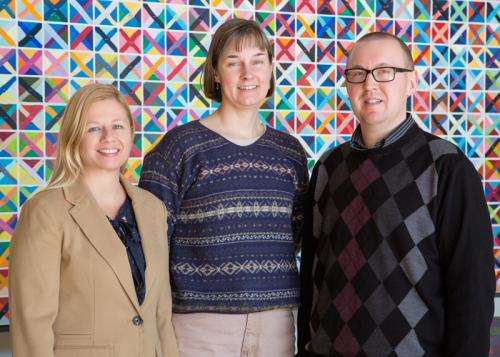Public schools’ service learning projects often fail at inclusiveness, marginalizing students with disabilities from full, meaningful participation, according to a new paper by Jay Mann, the director of the Office of Clinical Experiences in the College of Education. Michelle Bonati, graduate student, left, and Stacy Dymond, a professor of special education at Illinois collaborated on the research. Credit: L. Brian Stauffer
Service-learning projects have become popular in U.S. public schools for teaching citizenship values.
However, these curricula may be failing at their civic mission by promoting narrow views of civic engagement and marginalizing people with disabilities, say experts in special education at the University of Illinois and the University of Maine.
While service-learning experiences enrich education by moving away "from the stale, rote memorization that most adults seem to think of when they reflect on their own government courses in school," these curricula often promote a singular vision of citizenship that compromises their educational effectiveness, said lead author Jay Mann, who is the director of the Office of Clinical Experiences in the College of Education at Illinois.
"Unfortunately, a lot of civic education is still rooted in the idea that there's a concrete body of knowledge that every American has to learn in order to be an effective citizen," Mann said. "And while I don't discredit the significance of that background knowledge, so much of it is dependent upon what students do in the classroom and are guided to do by their teachers. Students need to be empowered to take action and find a role in their communities so they can put into practice the civic ideals that we want them to develop."
To promote a multifaceted understanding of citizenship, the researchers suggest that schools offer children multiple, unique and varied service-learning experiences that let them explore different expressions of and purposes for civic action, such as altruism, celebrating diversity or political socialization.
In this way, students develop a comprehensive understanding of their roles and responsibilities as citizens.
Access to citizenship education and service learning also needs to be broadened for students with disabilities, who oftentimes are excluded from these curricula except as the "less fortunate" recipients of altruistic services.
Even civics and social studies curricula that emphasize diversity often overlook disability culture, the researchers said.
Failing to integrate students with disabilities into these activities confers them with "restrictive citizenship," reinforcing misbeliefs that disability is not a form of diversity, according to the researchers.
Teachers may exclude students with special needs from general curriculum citizenship courses because the teachers are unsure how to adapt lessons to accommodate students with varying abilities or because teachers feel uncomfortable asking the students to participate in service projects.
To promote broader inclusion of students with disabilities, the researchers suggest greater flexibility is needed in developing citizenship curricula and educational objectives. If teachers develop individualized learning goals – rather than blanket objectives for the entire class – students would be able to learn concepts that are developmentally appropriate for them while collaborating on projects with peers who have different abilities.
"When all students are provided with opportunities to engage in service-learning, that needs to come with the understanding that that engagement will look very different for different children," Mann said. "It simply cannot be one-size-fits-all. You need to give the opportunity for children to participate meaningfully in the activities, but also appropriately given their respective talents and abilities."
The manner in which projects are presented also teaches students important lessons about empowerment, self-determination and inclusion.
Projects can be presented as opportunities to meet a particular need or goal in the community – such as building a playground for children with a range of abilities – rather than as acts of service that students are undertaking to benefit groups of people who share a perceived deficit, such as age or disability.
When projects are undertaken to benefit a specific group, the objective should be collaboration – teaching children how to work with the recipients to define and implement the project to ensure that the end product meets recipients' needs.
Conceptualizing projects as collaborative enterprises teaches students about concepts of empowerment, self-determination and collaboration, rather than pity, charity and dependence.
More information: Jay A. Mann, Stacy K. Dymond, Michelle L. Bonati, and Lance S. Neeper, "Restrictive Citizenship: Civic-Oriented Service-Learning Opportunities for All Students." Journal of Experiential Education. 1053825913514731, first published on January 3, 2014 DOI: 10.1177/1053825913514731
Provided by University of Illinois at Urbana-Champaign



















